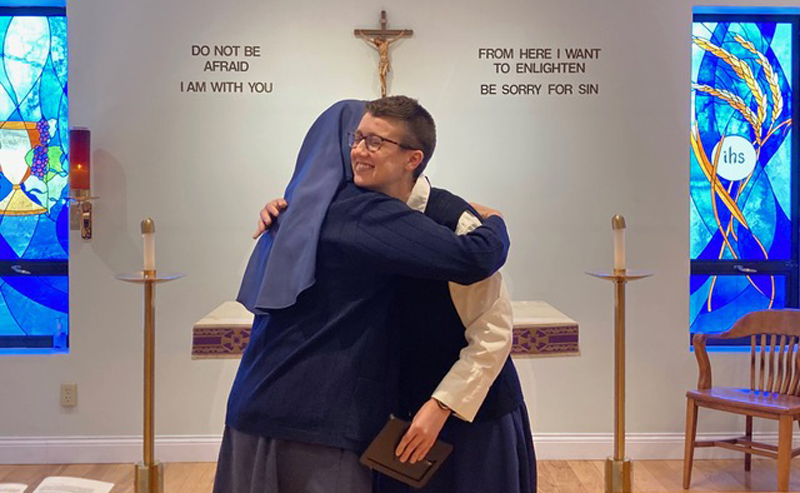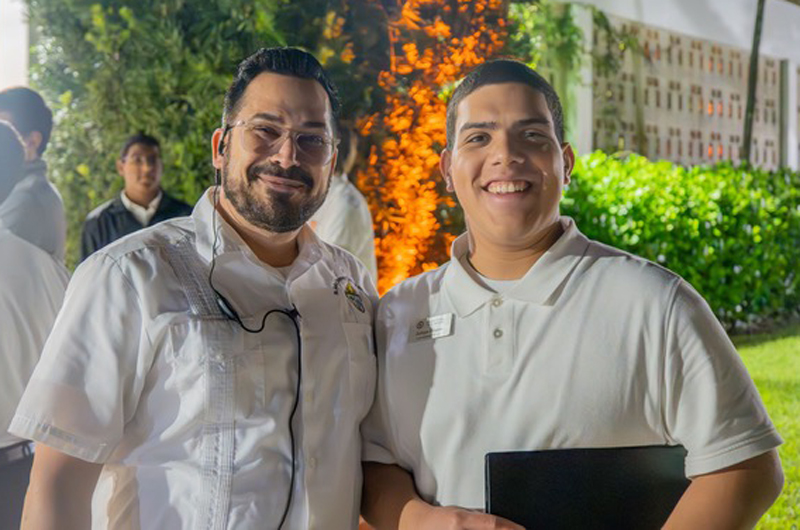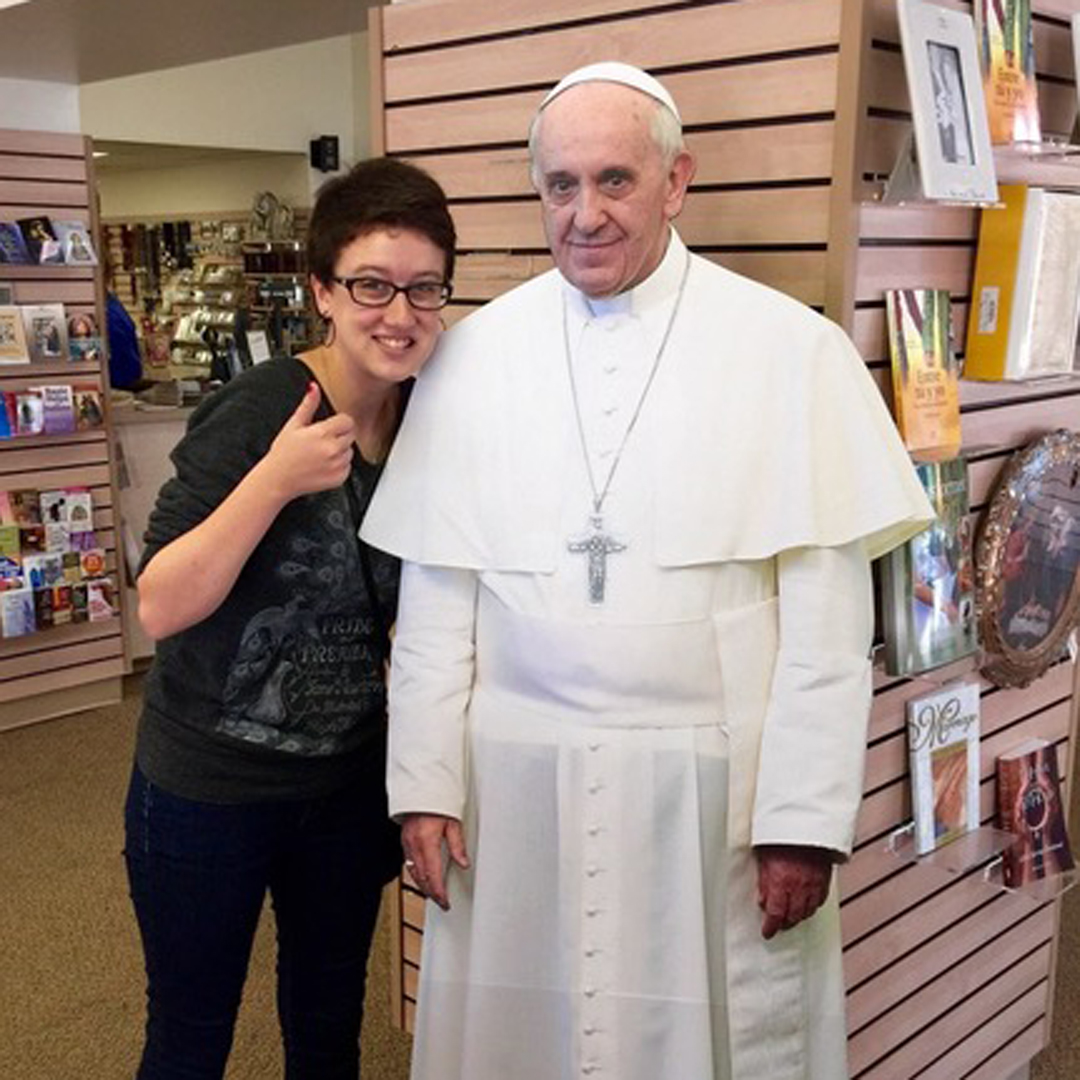By Emily Chaffins -

Photographer: COURTESY
Catherine Addington poses with a cardboard "Pope Francis" at Pauline Books & Media in Alexandria, Virginia days before seeing the real Pope Francis in Washington, D.C. Sept. 23, 2025 during his Apostolic Visit.
MIAMI | In fourth grade, Catherine Addington attended a field trip to a convent, where she heard her calling. Gazing at the sanctuary lamp in the chapel, she thought, “If nuns get to live with Jesus, then sign me up!”
Originally from Alexandria, Virginia, Addington was on fire for her faith as a girl. “In the process of picking a confirmation saint, there was a time when I was literally carrying around an encyclopedia of saints,” she recalled. “They lived important lives, caring about important things. I had this sense that they were living in reality and the rest of us were doing things that didn’t mean as much.”
However, at 15 years old, she underwent a “serious crisis of faith.”
“It was a combination of things. The reality of the abuse crisis caused me to doubt whether I could feel safe or at home in the Catholic Church, but it was also other things,” she said. “Were people like me welcome in the Church?... People who were not picture-perfect Catholics?”
At 17, she began attending the Orthodox Church, where she worshipped throughout college, “a time was really precious” for her.
But she still felt the pull of the Catholic Church and her vocation.
Addington was writing for a magazine in Washington, D.C. when Pope Francis made an apostolic visit Sept. 23, 2015. She maneuvered through the crowd at the National Mall to get a story and see the popemobile.
“I’m standing, flags are waving, everyone is spontaneously singing and clapping, and I remember thinking, I feel really at home with these people,” she said. “Until the pope went by and I found myself cheering and excited, I kind of didn’t realize I was still Catholic.”
That moment was the little push she needed.
“I found myself reflecting that week about how the message that he always brought everywhere he visited was about what was on my heart: going to find the lost sheep, going to find people on the margins for people to come home,” she said. “I thought, maybe the door is open. Maybe there is space for people like me.”
Within a week, she returned to the Church. “Because I felt like there was an open door, I walked back in. It was totally a movement of grace, but God used Pope Francis to open that door. I’m so grateful for that.”
Addington is now a young novice with the Daughters of St. Paul.
After the pope’s recent hospitalization, she decided to send him a thank-you letter with her prayers – never expecting a reply.
However, on April 22, 2025, the day after his death, she received one.
“I got a response from one of his secretaries saying thank you for the letter, and it was a personalized response,” she said. “It gave me and all my loved ones and my community the Apostolic Blessing of Pope Francis, and it included a picture of Pope Francis waving.”
The letter brought her peace. “It didn’t have to arrive that day. And God arranged that because that was him saying that this is bigger than one person, this is bigger than Pope Francis,” she said. “This is about how God always wants to console his people and let us know that Jesus is really the one who is always expressing his love for us, whether it’s through the pope or through a secretary at the Vatican.”
She chuckled, adding, “So I didn’t technically meet the pope, but I feel like he and I met in the sense that when he went to heaven, he immediately started doing things for me.”

Photographer: COURTESY
Catherine Addington is embraced by a Daughter of St. Paul after professing her vows. Addington is now a novice with the order.
SIMPLICITY OF LIFE IS VERY IMPORTANT
As for seminarian James Duque, Pope Francis was also instrumental in his vocation, turning his relationship with God from fearful to trusting.
“When I first entered seminary, I was a little scrupulous,” said Duque, who is in his Discipleship III year at St. John Vianney College Seminary in Miami. “I had an unhealthy understanding of God – that I’m down here and he’s all the way up there, and I’m not worthy.”
A fellow seminarian encouraged him to read Pope Francis’s The Name of God is Mercy. “The pope radically challenged my view and my vocation,” he said.
“He had this tremendous understanding that, above all, God is mercy and love, which transformed the way that I saw God,” he said, as “this merciful, sweet, loving father.” He added, “It changed my outlook on people and the world.”
Duque believes that Pope Francis had a lot to teach aspiring priests.
“I think Pope Francis really understood that the pope needs to be seen as one of the people, as a father, as a shepherd… I think he dressed simply because he understood that people don’t respond to a proud, kingly look,” he said. “There is a tendency as seminarians to get kind of lost in the bells and smells of liturgy and to become sort of out of touch with people… Pope Francis was a good reminder that simplicity of life is very important. And not to lose yourself in high Church.”
Pope Francis also impacted the way that seminarians discern. According to National Catholic Register, in 2016 the pope called for a new “propaedeutic” stage of formation as a period to discern and acclimate to seminary life.
Although Duque did not participate in the propaedeutic year because St. John Vianney College Seminary implemented it a year after he arrived, he is impressed by the difference it makes.
“The propaedeutic year basically acts as a separate program. They live outside the seminary grounds, across the street,” he explained. Those in propaedeutic year are allowed only limited cell phone use to encourage them to grow as a community. The year of formation “gives them more space to pray and to think,” explained Duque.
“I think the beauty of that was, when they left the propaedeutic stage and entered into the rhythm of regular seminary life, they retained this remarkable sense of community,” he said, referring to fellow seminarians who underwent the propaedeutic year. “When I entered, not to say that our classes weren’t communal, but certainly I didn’t realize that we weren’t as communal until I saw them come in.”
Observing them frequently “doing things together,” from playing board games to hanging out on the patio, Duque says the propaedeutic year “made them more brotherly and it gave them much better fraternity than our classes,” calling those “great gifts.”

Photographer: COURTESY
James Duque poses with a fellow seminarian from St. John Vianney College Seminary in Miami. Duque is in his Discipleship III year of formation at the seminary.

